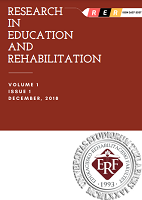OSJETI MIRISA I OKUSA KOD DJECE SA POREMEĆAJEM AUTISTIČNOG SPEKTRA
SENSES OF SMELL AND TASTE IN CHILDREN WITH AUTISM SPECTRUM DISORDERS
Author(s): Bahira Demirović, Mirsada Čakal, Nermin DemirovićSubject(s): Cognitive Psychology, Health and medicine and law
Published by: Edukacijsko-rehabilitacijski fakultet Univerziteta u Tuzli
Keywords: sensory processes; smell and taste; the children with autism; children with intellectual disabilities;
Summary/Abstract: Senses man communicating, new experiences, makes connections, entering into relationships. Both children first learn about their bodies through the senses: touch, movement, smell and taste, and then learn about objects from the vicinity of sight and hearing. The sense of smell plays an important role in the evocation of memory and together with the sense of taste is of great importance to the overall development of the child. Children with autism in their characteristics show a sensory deficit in all sensory areas including sensitivity to taste and smell. The aim of this research was to evaluate the sensory processes of smell and taste and sensory deficits determine the process of smell and taste in children with autism spectrum disorders compared to children with disabilities and children with typical development. Data was collected in the test method with the use of questionnaires Short Sensory Profile (Dunn, 1999). A sample of 105 children aged up to 8 years, both sexes, preschool and primary schools in the Federation of Bosnia and Herzegovina. The results showed that there is a difference in sensory processes smells and tastes of children with autism compared to other two groups of respondents.
Journal: Research in Education and Rehabilitation
- Issue Year: 1/2018
- Issue No: 1
- Page Range: 59-65
- Page Count: 7
- Language: Bosnian

